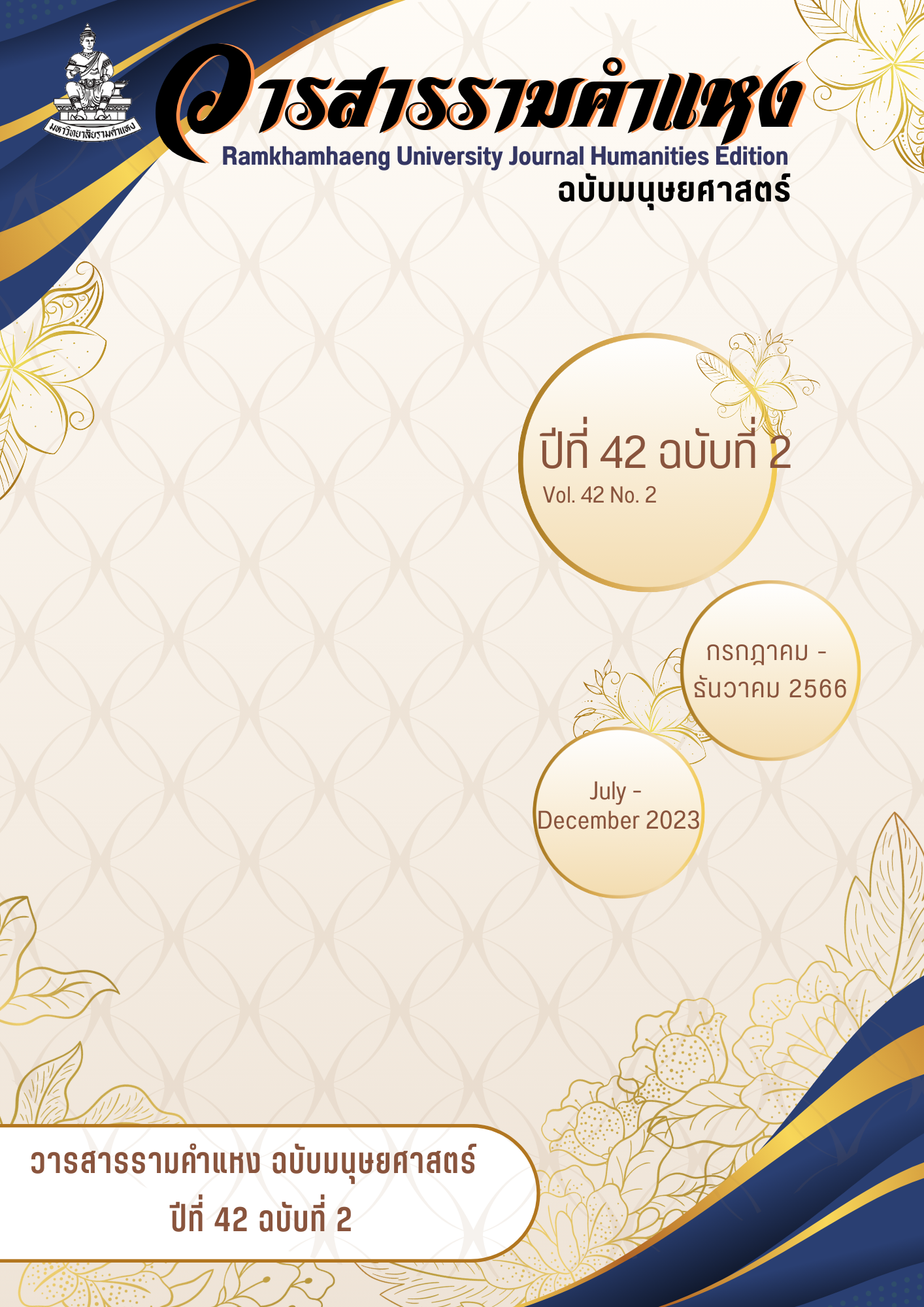การศึกษาการพูดกระตุ้นและการตอบกลับอารมณ์ขัน ที่ไม่ประสบความสำเร็จของคนไทย
Main Article Content
บทคัดย่อ
งานวิจัยนี้มีจุดมุ่งหมายเพื่อศึกษาปรากฏการณ์การสื่อสารเกี่ยวกับการกระตุ้นอารมณ์ขันที่ไม่ประสบความสำเร็จของคนไทยโดยมีวัตถุประสงค์ 2 ประการ คือ เพื่อศึกษารูปแบบทางภาษาของถ้อยคำและเพื่อศึกษารูปแบบการตอบกลับการกระตุ้นอารมณ์ขันที่ไม่ประสบความสำเร็จของคนไทย ข้อมูลที่ใช้ในการวิเคราะห์รวบรวมจากคลิปการสนทนาจากช่องยูทูบจำนวน 100 คลิป และการสัมภาษณ์กลุ่มตัวอย่างจำนวน 30 คนเกี่ยวกับประสบการณ์เรื่องการกระตุ้นอารมณ์ขันและ การตอบกลับอารมณ์ขันที่ไม่ประสบความสำเร็จ ผลการวิจัยพบรูปแบบทางภาษาของการกระตุ้นอารมณ์ขันที่ไม่ประสบความสำเร็จจำนวน 5 รูปแบบ ได้แก่ การใช้ถ้อยคำที่ทำให้ผู้ฟังสับสน การใช้คำพ้องรูปและ/หรือคำพ้องเสียง การเล่นคำ การใช้คำผิด และการใช้ภาษาถิ่น ส่วนผลการวิจัยเรื่องรูปแบบการตอบกลับการกระตุ้นอารมณ์ขันที่ไม่ประสบความสำเร็จจำแนกออกเป็น 10 รูปแบบ ได้แก่ การใช้คำถามเชิงวาทศิลป์ การกล่าวแสดงความคิดเห็นต่อการกระตุ้นอารมณ์ขัน การเปลี่ยนหัวข้อในการสนทนา การพูดปรับแก้ถ้อยคำกระตุ้นอารมณ์ขัน การกล่าวซ้ำถ้อยคำกระตุ้นอารมณ์ขัน การพูดประชด การแสดงท่าทาง การใช้ความเงียบ การยิ้มหรือการ (แกล้ง) หัวเราะ และ การตอบกลับรูปแบบอื่น
Article Details

อนุญาตภายใต้เงื่อนไข Creative Commons Attribution-NonCommercial-NoDerivatives 4.0 International License.
ประกาศลิขสิทธิ์จะปรากฏในเกี่ยวกับวารสาร ควรอธิบายสำหรับผู้อ่านและผู้เขียนว่าเจ้าของลิขสิทธิ์เป็นผู้เขียนวารสารหรือบุคคลที่สาม ควรรวมถึงข้อตกลงการอนุญาตเพิ่มเติม (เช่นใบอนุญาตครีเอทีฟคอมมอนส์) ที่ให้สิทธิ์แก่ผู้อ่าน (ดูตัวอย่าง) และควรให้วิธีการรักษาความปลอดภัยหากจำเป็นสำหรับการใช้เนื้อหาของวารสาร
เอกสารอ้างอิง
นิรนาม.100 อันดับฮิตล่าสุดในประเทศไทย. (14 พฤษภาคม 2563). https://th.noxinfluencer.com
ราชบัณฑิตยสถาน. (2556). พจนานุกรมฉบับราชบัณฑิตยสถาน พ.ศ. 2554. กรุงเทพมหานคร: ศิริวัฒนาอินเตอร์พริ้นท์.
วรรณนิภา วงค์ปัญญา. (2558). มิติบริบทในการกระตุ้นอารมณ์ขันในการแสดงตลกเดี่ยว. กรุงเทพมหานคร: วิทยานิพนธ์ศิลปศาสตรมหาบัณฑิตมหาวิทยาลัยธรรมศาสตร์.
วรวรรณ เฟื่องขจรศักดิ์. (2560). บทบาทของถ้อยคำแสดงการตระหนักรู้เชิงอภิวัจนปฏิบัติศาสตร์ในการปฏิสัมพันธ์ของชาวไทยและชาวญี่ปุ่น. กรุงเทพมหานคร: วิทยานิพนธ์ปรัชญาดุษฎีบัณฑิต มหาวิทยาลัยธรรมศาสตร์.
Bell, N. (2009a). Impolite responses to failed humor. In: Delia Chiaro & Neal Norrick (Eds.), Humor in interaction, (pp. 143–163). Amsterdam: John Benjamins.
Bell, N. (2009b). Responses to failed humor. Journal of Pragmatics, 41, 1825–1836.
Bell, N. (2013). Responses to incomprehensible humor. Journal of Pragmatics, 57, 176–189.
Bell, N. (2015). We are not amused: Failed humor in interaction. Berlin: De Gruyter.
Bell, N. & Attardo, S. (2010). Failed humor: issues in non-native speakers’ appreciation and understanding of humor. Intercultural Pragmatics, 7, 423-477.
Culpeper, J. (1996). Towards an anatomy of impoliteness. Journal of Pragmatics, 25, 349-367.
Culpeper, J. (2005). Impoliteness and entertainment in the television quiz show: the Weakest Link. Journal of Politeness Research, 1, 35-72.
Culpeper, J., Bousfield, D. and Wichmann, A. (2003). Impoliteness revisited: with special reference to dynamic and prosodic aspects. Journal of Pragmatics, 35, 1545-1579.
Hay, J. (1994). Jocular abuse in mixed-group interaction. Wellington Working Papers in Linguistics, 6, 26–55.
Hay, J. (2000). Functions of humor in the conversations of women and men. Journal of Pragmatics, 32(6), 709–742.
Hay, J. (2001). The pragmatics of humor support. Humor: International Journal of Humor Research, 14(1), 55–82.
Holmes, J. & Marra, M. (2002a). Having a laugh at work: How humour contributes to
workplace culture. Journal of Pragmatics, 34, 1683–1710.
Holmes, J. & Marra, M. (2002b). Humour as a discursive boundary marker in social
interaction. In Duszak, A. (Ed.), Us and others: Social identities across languages, discourses and cultures, (pp. 377–400). Amsterdam: John Benjamins.
Holmes, J. & Marra, M. (2002c). Over the edge?: subversive humor between colleagues and friends. Humor, 15, 65-87.
Holmes, J. & Stubbe, M. (2003). Power and politeness in the workplace. New York, NY: Routledge.
Leech, G. (2014). The pragmatics of politeness. Oxford: Oxford University Press.
Liu, S., Volčič, Z., and Gallois, C. (2015). Introducing Intercultural communication: global cultures and contexts. London: Sage.
Mullany, L. (2011). Im/politeness, rapport management and workplace culture: truckers performing masculinities on Canadian ice-roads. In: Bargiela-Chiappini, F. and Kádár, D. (Eds.), Politeness across culture (pp. 61-84). Basingstoke: Palgrave Macmillan.
Oxford River Books Concise English-Thai (10 สิงหาคม 2565). Retrived from: https://apps.apple.com/th/app/oxford-river-books-concise/id599272100
Palmer, J. (1994). Taking humour seriously. New York, NY: Routledge.
Schnurr, S. & Chan, A. (2011). When laughter is not enough: responding to teasing and self-denigrating humour at work. Journal of Pragmatics, 43, 20-35.
Sinkeviciute, V. (2014). “When a joke’s a joke and when it’s too much”: Mateship as a key to interpreting. Journal of Pragmatics, 60, 121-139.
Xu, Z. (2012). Humor and contextual dimension: A comparative study on humor in selected Chinese and English situation comedies. (Unpublished doctoral dissertation). Shanghai University of International Study, Shanghai.


